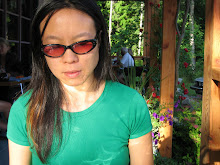first day on the job
Panel talk yesterday at National Taiwan Normal University with Fred Wah and Rita Wong. Question on the table: What is the difference between Asian American and Asian Canadian Literature? There probably are differences that one could discuss if one wanted to make certain generalizations, as I did in an earlier, brainstorming blog. But talk/thinking it through with Fred and Rita beforehand, we found ourselves agreeing that these categories are more interesting when they are resisted than they are when hailed and validated. We talked about the historical construction of the term "Asian" as it circulates in North America. Fred talked much about the founding traumas of racial identity as it works in Canada-- The Indian Act, the Chinese Head Tax, the Chinese Exclusion Act, the use of the War Measures Act that brought about the Japanese Canadian Interment. He spoke about the Trudeau's Multiculturalism Act as one that legislated difference, but also functioned as a sort of "sedative politics" that allowed the nation much self-congratulation with effecting any real material change.
Rita talked about the gendered implications of the Head Tax (which tended to limit the immigration of women). She talked about our generation having to dig for this history-- it was not taught to us at school. She asked what it means to live in a colony that remains centred around whiteness, and asked if there are other ways of living on the land, with a different kind of relationship especially to history and the law.
To continue the conversation, I began by talking about what it was like for my own generation coming, through much hard work and grief, to an awareness of this history. Our problem is how to construct a liberatory subjectivity for ourselves, that is neither assimilated nor so attached to the trauma of the past that it doesn't have being beyond it. It seems to me that writing is a very important tool to work these questions through. Much of the initial work of the 80s and 90s had, necessarily, to be about bringing repressed histories of trauma to light. The problem is that as soon as these narratives take book form, they become products ready for the market. While they provide a measure of entry into polite society, they also become tools for the entry into hegemonic power in ways that the writers might not have envisioned or desired before publication. One might say of the book what Hardt and Negri say about the nation state-- that it is the poisoned gift of national liberation movements.
Rita talked about the gendered implications of the Head Tax (which tended to limit the immigration of women). She talked about our generation having to dig for this history-- it was not taught to us at school. She asked what it means to live in a colony that remains centred around whiteness, and asked if there are other ways of living on the land, with a different kind of relationship especially to history and the law.
To continue the conversation, I began by talking about what it was like for my own generation coming, through much hard work and grief, to an awareness of this history. Our problem is how to construct a liberatory subjectivity for ourselves, that is neither assimilated nor so attached to the trauma of the past that it doesn't have being beyond it. It seems to me that writing is a very important tool to work these questions through. Much of the initial work of the 80s and 90s had, necessarily, to be about bringing repressed histories of trauma to light. The problem is that as soon as these narratives take book form, they become products ready for the market. While they provide a measure of entry into polite society, they also become tools for the entry into hegemonic power in ways that the writers might not have envisioned or desired before publication. One might say of the book what Hardt and Negri say about the nation state-- that it is the poisoned gift of national liberation movements.


0 Comments:
Post a Comment
Subscribe to Post Comments [Atom]
<< Home